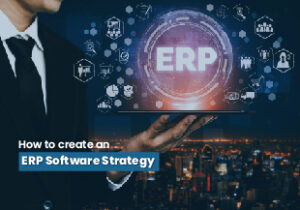ERP Software streamlining processes, effective use of resources, and real-time data can help manufacturers compete. The game-changer now for manufacturers is the fully integrated Cloud-based Enterprise Resource Planning (ERP) that caters to the optimization and productivity needs of a process. Choosing the right one for your manufacturing business becomes a difficult task due to the variety of options presented. This article delves into the essential considerations for choosing the best cloud ERP to streamline your operations and their benefits.
What is Cloud ERP? Cloud ERP refers to a type of business software that is saved remotely on servers and is used via the internet. This ERP Software does not have much expensive hardware installed inside it, nor is an in-house IT team required for maintaining these. It offers manufacturers with an easily accessible central point through which all the significant business operations including production, inventory, purchase of supplies, finance, and customer relationship management could be managed. Cloud ERP supports ERP forecasting, enabling businesses to predict future trends, streamline processes, and make informed decisions based on data insights.
Choose the Best Cloud ERP for Manufacturing
Selecting the right cloud ERP for manufacturing is important to achieving your operational goals. Here are the steps to guide you through the process:
Assess Your Business Needs
Before evaluating ERP options, identify your manufacturing business’s unique requirements. Consider factors such as:
- Production volume and complexity
- Inventory management needs
- Supply chain integration
- Financial and reporting requirements
- Workforce management
Create a list of must-have features and functionalities based on these requirements.
Evaluate Industry-Specific Solutions
Many cloud ERP providers offer industry-specific solutions tailored to manufacturing. Look for systems designed to handle challenges unique to manufacturing, such as:
- Bill of Materials (BOM) management
- Production scheduling and planning
- Quality control
- Regulatory compliance
Industry-specific ERPs often include pre-built templates and workflows that save time and reduce customization costs.
Prioritize User-Friendliness
A complex ERP system with a steep learning curve can hinder adoption and reduce efficiency. Choose a solution with an intuitive interface and straightforward navigation. Additionally, ensure the ERP provider offers adequate training and support for your team.
Check Integration Capabilities
Manufacturers often use various tools and software for operations, such as CAD systems, accounting software, or customer management tools. Ensure the cloud based erp for manufacturing you choose integrates seamlessly with your existing systems to avoid data silos and duplication of efforts.
Evaluate Customization Options
While out-of-the-box solutions are quicker to implement, customization may be necessary to address specific business needs. Choose a cloud ERP that offers flexibility for custom workflows, reports, and dashboards.
Consider Vendor Reputation
The reputation of the ERP vendor is critical to the success of your implementation. Research the vendor’s experience, customer reviews, and case studies. A reliable vendor should have a proven track record of working with manufacturing businesses similar to yours.
Review Security Measures
Given the sensitivity of manufacturing data, robust security features are non-negotiable. Ensure the cloud ERP complies with industry standards and certifications, such as ISO 27001 or SOC Key security features to look for include:
- Data encryption
- Multi-factor authentication
- Regular security audits
Plan for Future Growth
Your chosen cloud ERP should support your business’s long-term growth. Assess its scalability, ability to handle increased data volumes, and potential for adding new features or modules as your business evolves.
Calculate Total Cost of Ownership
While cloud ERPs are generally cost-effective, it’s essential to evaluate the total cost of ownership. Consider the following:
- Subscription fees
- Implementation costs
- Training expenses
- Potential customization charges
- Long-term maintenance and support costs
Request Demos and Trials
Before making a final decision, request demos or trial periods from shortlisted vendors. Hands-on experience with the system will help you evaluate its usability, performance, and suitability for your operations.
Best Cloud ERP Features for Manufacturing
Among these are efficiency and productivity improvements when considering features about cloud ERPs.
- Production Management: Tools help plan, schedule, and track production to keep things running smoothly.
- Inventory Control: Track raw materials and finished goods in real time to minimize stockouts and overstocking.
- Supply Chain Management: Works closely with suppliers and vendors for easier buying and delivery.
- Quality Assurance: All the things to check and keep product quality standards during the production process.
- Financial Management: Complete solution for managing accounts, budget planning, and reports on finance.
- Analytics and Reporting: Detailed reports and analysis to give useful information about how the business is doing.
- Mobile Access: Compatibility with mobile devices for on-the-go monitoring and decision-making.
Advantages of Cloud ERP for Manufacturing
- Scalability: Change operations easily to suit production needs.
- Cost-Effectiveness: No upfront costs; affordable subscription-based model.
- Real-Time Data: Get real-time operational insights for better decisions.
- Collaboration: The unified platform improves teamwork across departments.
- Security: Deep measures protect critical data from hazards.
- Automatic Updates: Stay up to date with the latest features and fixes.
Prismatic: Empowering Manufacturing with the Best Cloud ERP Streamline, Optimize, and Thrive.


